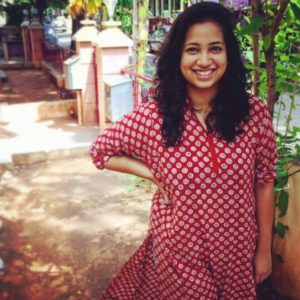Kanya, an evocative short film, is based on the personal experience of young director Apoorva Satish undergoing rituals that are forced on young girls on attaining

puberty which also put a curb on many freedoms enjoyed so far. The film had its world premiere at the Busan International Film Festival (South Korea) in the Wide Angle: Asian short film competition category followed by a European Premiere at Raindance Film festival 2020 (England). In a freewheeling chat with Shoma A. Chatterji, the director talks about herself and her film
Excerpts of an interview :
Did you have to go through these rituals yourself?
Yes, I did. I was learning to swim when I got my first period. My mom called my swimming coach and explained I couldn’t make it to swimming lessons anymore. Then my parents started planning this ritual around my first menstruation. Close family members and friends were invited. That whole day was a blur for me. I just remember they made me sit in the centre of a room and performed a lot of rituals. It was overwhelming. I had no idea what my body was going through and how exactly it would impact me emotionally, physically, and mentally. But everyone else was celebrating my becoming a ‘woman’. It was the same for my mom when she had asked my grandma why she was not feeling okay those four days every month. She told my mom she was bitten by a dog. She didn’t know what the dog bite was until she got her period.
Are the girls even aware that they have to undergo these practices to legitimise womanhood? And continuing to this century even in urban and modern families like the one Kanya belongs to?
This was intentional. I wanted my audience to question the same way about the film as you are doing. I had these questions when I was conceptualising this script. No one had explained the point of these rituals to me. In my family, like others, this ritual was practised for several generations without question. This is how my great-grandmother got married. The community got to know she was ready to have a family. My great grandfather was there with his parents at the ritual. They got married months after this ritual. My great-grandmother was only 11 when she gave birth to my grandma.
The cinematography and the shot compositions are incredible. How did you interact with your cinematographer about the whole process of this ritual?
Interestingly, the images were constructed first. The first thing I did was to describe all the imagery I had in my mind to my cinematographer. We discussed every single image I remember from that time and then pieced the story together around them. It’s an unconventional way of working on a story but I think for Kanya, our approach worked.
Since I was working in a short format, I wanted to stick to the inner dissonance. If I had to explain the details of the rituals, the film would have to be a lot longer. Since this is my graduation film, I also had other limitations – time, logistics, (the film was shot in two countries – India and Czech republic), and more importantly, the budget. I had to be aware of these external limitations while conceptualising the idea.
Is diving also used as a metaphor for Kanya whose life changes radically and she cannot understand why?
Yes. I also used water as a metaphor in the film. Water is a strong symbol. Man is born of water. Kanya is a swimmer. Menstruation and the topic of reproductive health also fit in, and in the film, water is ultimately a symbol of freedom – Kanya feels calmer underwater than above the water.
Talk a bit about your foray into films
Raised in Chennai, I was fascinated by the power of Tamil filmdom on state politics. It ignited in me a passion for creating films that are socially and politically aware. To hone my creative skills as a filmmaker, I travelled to many countries: Sri Lanka, Israel, Italy, Jordan, England, and the USA to work on fiction and non-fiction projects. In 2016, I was selected to attend the International Filmmaking Academy in Bologna under the tutorship of award-winning directors Danis Tanovic and Claudia Llosa.
I recently received my MFA degree from the Film and TV School of the Academy of Performing arts, Czech Republic. Kanya is my graduation film. I am currently based in Prague, developing my debut feature film while actively exploring short and long-format film projects. Kanya has already been chosen for screening at around 12 film festivals in India and abroad.
(TWF)



